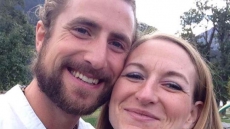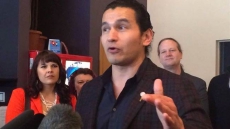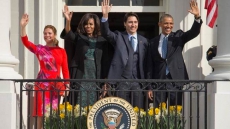OTTAWA — The new Liberal government delivered a sunny ways budget Tuesday brimming with optimism and billion-dollar spending increases spread across a wide spectrum of society.
But the bold effort to spur economic growth after almost a decade of fiscal restraint will add more than $100 billion to the federal debt over the next five years as Finance Minister Bill Morneau plunges Ottawa back into the red.
And like March sunshine in the frozen national capital, there's concern that Prime Minister Justin Trudeau's bright budget may not heat up the economy quite as much as the Liberals promised it would.
"We act for the years and decades to come," Morneau said in his maiden budget speech in the House of Commons.
"We act for our children and our children's children."
There's billions in new spending on infrastructure, Aboriginal Peoples, and transfers to middle and lower income Canadians in a budget blueprint framed by Morneau in terms of Canada's great post-war expansion of the last century.
"Confidence inspired investment," Morneau said of those high-growth, post-war decades. "Investment inspired confidence."
The Liberals claim their budget will create 100,000 jobs and boost national economic growth, as measured by gross domestic product, by half a percentage point per year — a huge increase on a $2 trillion economy.
The promised sunny future comes with an immediate fiscal chill.
The Liberals are projecting a $29.4-billion deficit in 2016-17, followed by a $29-billion shortfall the following year and almost $23 billion in 2018-19. Over the next five years, Tuesday's budget shows $113.2 billion in red ink, including a $14.3 billion shortfall for 2020-21 — after the next scheduled federal election.

During last year's campaign, the Liberals promised "modest deficits" of no more than $10 billion over the course of their mandate and to balance the books by 2019-20.
Times, it seems, have changed: The word "deficit" appeared nowhere in Morneau's budget speech, nor did "spending." "Investment," on the other hand, registered 22 times.
"Canadians gave them an inch and they're taking miles," Conservative interim leader Rona Ambrose said in a release, while calling the Liberal budget a "nightmare scenario for taxpayers."
The relatively slim, 269-page budget is packed with spending promises for all and sundry on every page. The final Conservative budget of April 2015, by contrast, weighed in at 518 pages while ratcheting down spending in a government-wide effort to show an election-year surplus.
On Parliament Hill, the post-budget stakeholder reaction bullpen — typically a cauldron of grievances — was largely singing the Liberal gospel.
But economist Craig Alexander of the C.D. Howe Institute sounded a note of caution.
"I think budget 2016 runs the risk of over-reaching," said Alexander. "The reality is the amount of money they have to make an impact is relatively limited."

It's the central paradox of the first Liberal budget: while plunging the country back into deficit, Liberal spending is constrained by a worse-than-anticipated economy that's forcing the government to spread its election promises over a longer time frame.
Put another way, the federal deficit balloons by almost $25 billion in 2016-17, yet new budgetary measures are costed at only $11.57 billion. New spending the following year is forecast at $14.9 billion.
"The challenge the government has faced is how do you actually deliver on as many of your election promises as you can, but with a binding fiscal constraint?" said Alexander.
New Democrats, who campaigned five months ago on a balanced budget platform, accused the big-spending Liberals of being cheap.
"Families across Canada are worried about their jobs and struggling to make ends meet, but today's budget told them they would have to wait longer for help," said NDP Leader Tom Mulcair.
Over the last three years, federal spending was held to an average 0.4 per cent increase per year, said Mary Webb, senior economist at Scotiabank. The next three years show average increases of 6.3 per cent.
"How do you close this gap here?" Webb wondered, short of tax increases or sharp cuts down the road.
The budget promises a slew of studies and commissions to develop more innovative economic policy, presumably with future price tags on top of the many funding announcements in the current budget.

These include:
— $8.4 billion over five years to help indigenous communities, including $2 billion on water and wastewater systems in First Nations and $2.6 billion over five years for primary and secondary education on reserves.
— $10 billion more over two years for a new Canada child benefit, absorbing and replacing both the Canada child tax benefit and the universal child care benefit.
— $6.6 billion over two years for infrastructure, less than the $10 billion promised in the Liberal election platform.
— $3.4 billion over five years to increase the guaranteed income supplement top-up benefit for single seniors, and restore the old age security eligibility age to 65 from 67.
— $2 billion over three years for a new strategic investment fund for infrastructure improvements at colleges and universities.
— $2 billion over two years for a low-carbon economy fund, beginning in 2017-18.
Jean-Francois Perrault, chief economist at Scotiabank who served as an assistant deputy minister at Finance Canada until the end of 2015, said the Liberals are over-confident in their projections of the budget's impact on Canada's economic growth.
But he repeatedly praised the budget's many specifics.
"There's a lot of interesting stuff in there," said Perrault. "It's a smartly designed piece of policy, no question about that."

SOME HIGHLIGHTS FROM THE FEDERAL LIBERAL GOVERNMENT'S 2016 BUDGET
OTTAWA — Some of the highlights of the federal budget tabled Tuesday by Liberal Finance Minister Bill Morneau:
— A deficit of $29.4 billion in 2016-17, nearly three times the $10 billion promised during the fall election campaign, and a projected deficit of $17.7 billion in 2019-20 rather than the balanced budget that was promised in October.
— $10 billion more over two years for a new Canada child benefit, absorbing and replacing both the Canada child tax benefit and the universal child care benefit. Targeted to low and middle-income families, the government says the new benefit provides an average increase of nearly $2,300 in 2016-17.
— $2.5 billion over two years on a suite of changes to employment insurance, including reducing the required work experience for new entrants and re-entrants; halving the two-week waiting period; extending a pilot project to allow claimants to work while collecting benefits; simplifying job-search requirements; and extending the benefit eligibility window in specific regions with a higher unemployment rate.
— An end to income splitting for couples with children, the children's fitness tax credit and the children's arts tax credit.
— A promised cut to the 10.5 per cent small business tax rate has been deferred indefinitely.
— $2.6 billion over five years for primary and secondary education on First Nations reserves, including language and cultural programs, plus $969.4 million over five years for education infrastructure.
— $1.2 billion over five years for social infrastructure for Aboriginal Peoples, including First Nations, Inuit and northern communities.

— $10.4 million over three years for new women's shelters in First Nations communities, and $33.6 million over five years and $8.3 million ongoing for support services.
— $5.6 billion more in benefits to veterans and their families over five years, including a disability award that increases to $360,000, retroactive to 2006, and an earnings loss benefit to injured vets of 90 per cent of pre-release salary. The government is also re-opening nine veterans' service offices across the country and adding a 10th.
— Planned National Defence purchases worth $3.7 billion — ships, planes and vehicles — are being deferred indefinitely.
— $1.53 billion over five years to increase Canada student grants to $3,000 from $2,000 for low-income students, to $1,200 from $800 for middle-income students and to $1,800 from $1,200 for part-time students.
— $3.4 billion over five years to increase the guaranteed income supplement top-up benefit by up to $947 annually for single seniors, and restore the old age security eligibility age to 65 from 67.
— $2.2 billion over five years in water and wastewater treatment and waste management as part of a 10-year green infrastructure investment plan.
— $1.9 billion over five years to support Canadian arts and culture organizations and cultural infrastructure, including the CBC and national museums.
— $2 billion over three years for a new strategic investment fund for infrastructure improvements at colleges and universities, in partnership with provinces and territories.
— $2 billion over two years for a low-carbon economy fund, beginning in 2017-18;
— More than $1 billion over four years to support future clean technology investments, including in forestry, fisheries, mining, energy and agriculture, plus $130 million over five years to support clean technology research and development.
— $345.3 million over five years to Environment and Climate Change Canada, Health Canada and the National Research Council to take action to address air pollution.
— $40 million over two years for the inquiry into missing and murdered aboriginal women and girls.

— Up to $178 million over two years for the provinces for urgent affordable housing needs.
— $38.5 million over two years to strengthen and modernize Canada’s food safety system.
— $142.3 million over five years to add new national parks and improve access during the 150th anniversary of Confederation.





